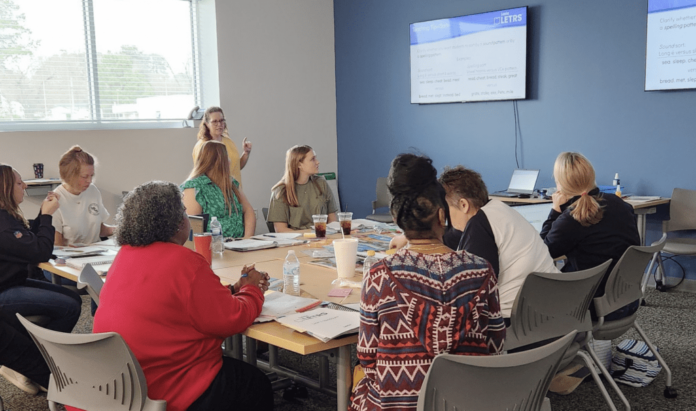Over the last several years, numerous states across the nation have made legislative updates requiring that early literacy professional development and instruction align to the science of reading based on decades of research.
For many states, this is the extent of the shift.
However, North Carolina legislators, policymakers, state leaders, and philanthropic partners took extra steps to support educators and students with sustainable funding and resources, including 115 Early Literacy Specialists (ELS) to coach and support every school district across the state.
District staff continue to express their gratitude for the commitment that North Carolina state leaders made to support the implementation model.
“Thanks to your support, our Early Literacy Specialist has transformed literacy in our district — building teacher collective efficacy and giving every child the chance to build a strong foundation in reading, an investment that will shape lives and strengthen our community for generations to come,” said Caitlin Spruill, the elementary education director in Dare County Schools.
“Thank you.”
— Caitlin Spruill
Phase one of the ELS support plan was strategically designed to use the ELS to serve in a dual role during the statewide implementation phase. Specifically, they were tasked with supporting the core systems shift at the district level and identifying one or two focus schools that would most benefit from aligned coaching based on data insights.
Dr. Anna Brooks, elementary education director in Carteret County Public Schools, noted, “Our ELS has provided a bridge from all of our professional learning around the science of reading to effective implementation of science of reading aligned practices in our classrooms which has amplified success for all of our students.”
“Our ELS has been a game-changer for our district,” said Tara Holmes, chief academic officer at Person County Schools. “Thanks to her leadership, we’ve been able to develop a literacy roadmap which aligns to our district strategic plan, we’ve implemented a science of reading phonics program, and provided targeted professional development based on walkthrough data.”
We now possess enough trend data to strategically align ELS coaching support, addressing areas of greatest need, which directly influences teachers and students within the schools.
The future of early literacy in North Carolina appears promising.
Dr. Deb Dowless, director of curriculum and instruction in the Public Schools of Robeson County, emphasized the broader implications of ELS efforts: “Our Early Literacy Specialist’s initiatives extend well beyond individual classrooms; she has become a driving force for collaborative, districtwide literacy enhancement. Through her expert guidance, our teachers have acquired valuable insights into literacy practices that empower them to create comprehensive lessons meeting the diverse needs of all students.”
North Carolina continues to benefit from the positive effects of Early Literacy Specialists, who serve as essential links from state to districts and schools. Data-driven coaching, when combined with consistent aligned leadership support, represents a powerful intervention that influences all aspects of systemwide change, from shifting mindsets and beliefs to ensuring the sustainable application of learning with fidelity.




